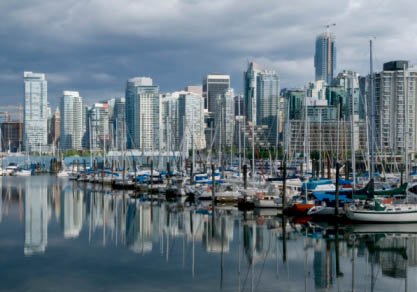Real estate lawyers in British Columbia who usually holiday in winter on a down buyer’s market found themselves busier than ever this past winter as offshore buyers, mostly from mainland China, were shopping for high-end B.C. properties in the seven-digit range.

Lawyer Florence T. Wong, who also hosts a Chinese language talk show on CHMB (1320 Mainstream Broadcasting Corp.), says in the past 10 years, she has seen the buyer profile shift from Hong Kong to mainland China. The emergence of a middle class and commercialism in China has placed capital in the hands of many mainland Chinese but recent restrictions at home on the number of properties that local residents can buy has many looking offshore. B.C. (and Canada) is seen as a safe place to invest. “China is still a communist country,” she says. “While there is a commercial side to China, the political aspect still remains.”
Lawyer James Lin, who also handles Asian clients with a majority coming from mainland China, says: “My experience with my clients is that the first part of 2011 and the later part of 2010 is the busiest it has been than in previous years. There was no lull such as we experience in January and February. It is contrary to what people are predicting with the new and more stringent mortgage rules.”
Lin says another trend he sees is that new Chinese buyers are coming with “large sums of money” and purchasing multiple houses within one year. These are houses on the west side of Vancouver with price tags of $1.5 million. The homes are not for speculating, but rather as an investment.
The ripple effect has had an impact on other real estate firms, such as that operated by Tony Spagnuolo, whose group of firms (in the Lower Mainland, Vancouver Island, and the Okanagan Valley) specializes in real estate and is one of the largest in B.C. “We do not see the Chinese client,” he says, “but what we are seeing is the impact on the whole market. It has been busier. It has been a good start to the year.” He also attributes that to the CMHC mortgage and amortization rules that came into effect March 18. “We are benefiting because when someone buys, someone sells. It’s a domino effect.”
The impact of immigration on the Vancouver market is seen in numbers collected by Deloitte Development LLC, which relies upon real estate intelligence tracking new home starts and sales and Statistics Canada figures. B.C. benefits from strong international immigration with an average of 43,000 immigrants coming to the province every year and close to 90 per cent choosing to live in Greater Vancouver. Jennifer Podmore Russell, senior manager in financial advisory for Deloitte, says StatsCan figures showed that “recent immigration levels have been exceptionally high as the Q2 and Q3 periods of 2010 recorded over 26,000 international immigrants coming to B.C., which was the highest six-month period since 1997.”
B.C. attracts the largest sector of immigrants coming to Canada under the investor classification with those coming from mainland China having a net worth of at least $1.6 million.

 Lawyer Florence T. Wong, who also hosts a Chinese language talk show on CHMB (1320 Mainstream Broadcasting Corp.), says in the past 10 years, she has seen the buyer profile shift from Hong Kong to mainland China. The emergence of a middle class and commercialism in China has placed capital in the hands of many mainland Chinese but recent restrictions at home on the number of properties that local residents can buy has many looking offshore. B.C. (and Canada) is seen as a safe place to invest. “China is still a communist country,” she says. “While there is a commercial side to China, the political aspect still remains.”
Lawyer Florence T. Wong, who also hosts a Chinese language talk show on CHMB (1320 Mainstream Broadcasting Corp.), says in the past 10 years, she has seen the buyer profile shift from Hong Kong to mainland China. The emergence of a middle class and commercialism in China has placed capital in the hands of many mainland Chinese but recent restrictions at home on the number of properties that local residents can buy has many looking offshore. B.C. (and Canada) is seen as a safe place to invest. “China is still a communist country,” she says. “While there is a commercial side to China, the political aspect still remains.”